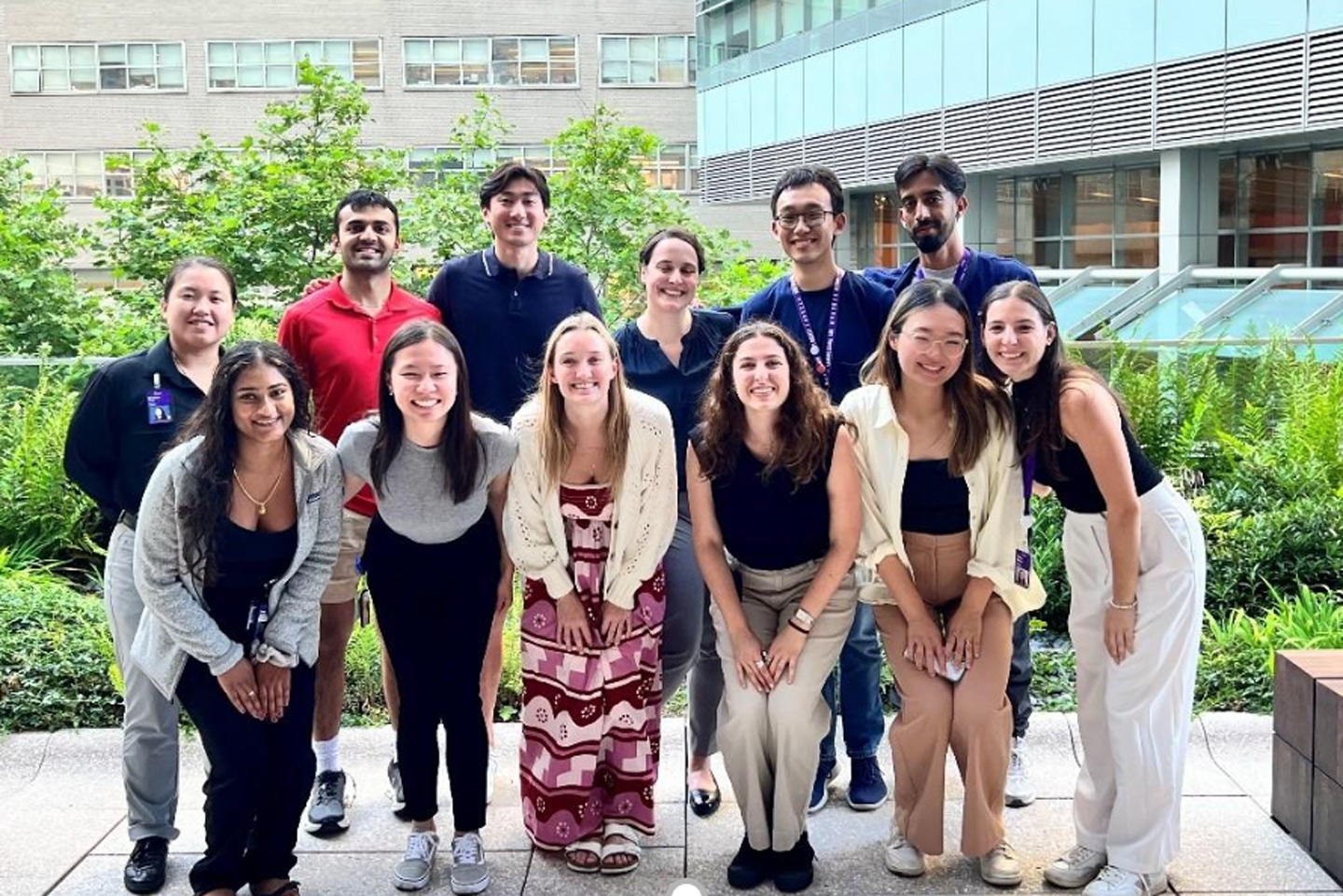
Medical Student Training in Aging Research
NYU Langone’s Division of Geriatric Medicine and Palliative Care offers an annual Medical Student Training in Aging Research (MSTAR) program for internal and visiting medical students. The program is funded by the National Institute on Aging.
As a trainee, you will be paired with a faculty mentor at NYU Grossman School of Medicine to work on one of their aging-related projects. During the eight-week program, which begins in June, you attend weekly didactic sessions focusing on career development, basic research, and key topics in geriatrics. Additionally, you gain exposure to clinical geriatrics practice by shadowing in multiple environments, including the NYC Health + Hospitals/Bellevue geriatrics clinic, the inpatient consult service at NYU Langone’s Tisch Hospital, and an ambulatory memory clinic.
You also attend didactics and trainings with geriatric and palliative care fellows completing their training at NYU Langone. This offers the opportunity to learn more about the pathway into geriatric medicine and palliative care.
At the end of the program, you present your work to your colleagues and faculty and prepare an abstract for submission to the annual meeting of the American Geriatrics Society.
NYU Langone’s MSTAR program is one of seven national training programs that offer aging-related research projects to medical students. NYU Langone has 16 MSTAR positions available for summer 2026.
To learn more about MSTAR, visit the American Federation for Aging Research (AFAR) website.
Didactic Topics
Trainees have the opportunity to attend a number of didactic lectures. These are some of the lecture topics:
- basic science of aging
- cardiology
- careers in geriatric medicine
- dementia
- ethics
- equity
- geriatrics/interdisciplinary care
- mentoring
- nephrology care
- nutrition
- palliative care
- responsible conduct of research and good clinical practice
Our 2026 MSTAR Mentors
Saul B. Blecker, MD
Research focus: chronic disease management
Joshua Chodosh, MD
Research focus: cognitive geriatrics, hearing loss, and program implementation
Daniel David, PhD, RN
Research focus: geriatric medicine and palliative care
John A. Dodson, MD, MPH
Research focus: geriatric cardiology
Adam Faye, MD
Research focus: inflammatory bowel disease
Ula Y. Hwang, MD, MPH
Research focus: emergency medicine, learning health systems, and healthcare innovation
Sanjit R. Konda, MD
Research focus: hip fractures and care partners
Michal A. Mankowski, PhD
Research focus: neurodegeneration and brain diseases
Arjun V. Masurkar, MD, PhD
Research focus: cognitive neurology, dementia, and Alzheimer’s disease
Mara A. McAdams DeMarco, PhD
Research focus: aging, cognitive function, chronic kidney disease, end-stage kidney disease, kidney transplant, and dialysis
Michal L. Melamed, MD
Research focus: chronic kidney disease
Komal Patel Murali, PhD, RN, ACNP-BC
Research focus: palliative care
Ravichandran Ramasamy, PhD
Research focus: cardiovascular biology, diabetes, and metabolism
Jennifer M. Reckrey, MD
Research focus: geriatric medicine and population health
Tina Sadarangani, PhD, RN, ANP-C, GNP-BC
Research focus: Alzheimer’s disease and health services research
Scott E. Sherman, MD
Research focus: smoking cessation, health promotion, and implementation
Jasmine Travers Altizer, PhD, MHS, RN, FAAN
Research focus: improving access to and use of long-term care services, home-based care, and community programs
Frequently Asked Questions
How do I know if I’m eligible for the program?
MSTAR eligibility requirements are set by the National Institute on Aging, which funds this program. These are some of the applicant requirements:
- allopathic or osteopathic medical students in good standing who will have successfully completed one year of medical school at a United States–based institution by June 2026
- United States citizens or noncitizen nationals or those who have a valid Permanent Resident Card, i.e., a Green Card, or other legal verification of such status
- ability to participate in the program full-time for eight weeks, from June 8 to July 31, 2026
Applicants receiving a stipend or salary support from a federal source are not eligible for this program. Applicants may not hold another award or participate in another program while concurrently participating in the MSTAR program.
How do I apply?
The 2026 MSTAR application period opens in December, and Acceptances will be sent out by March 2026. Our application is an online form that requires your resume/CV and a letter of recommendation from a faculty member at your home institution. Applicants are accepted via REDCap.
For additional information, please contact us at MSTAR@NYULangone.org.
Do you provide housing?
The NYU Langone MSTAR program does not provide housing. Accepted students are eligible for NYU student summer housing, pending availability.
Experiences from Past MSTAR Alumni
MSTAR Gallery
Read about some of the experiences from our 2024 MSTAR alumni:
“Prior to the summer, I really did not understand a lot of the geriatric terminology that I would hear in the hospital. Now, I feel I am more adept and can better explain to myself and to others certain aspects of aging.”
“It was helpful to apply what I learned in didactics to patient encounters. It also gave me a broader perspective on different research areas available within geriatrics.”
“The didactics cemented concepts that have been presented abstractly or pointed to in my home institution curriculum. I have learned a great deal about the actual structure of practicing geriatric and palliative medicine in New York clinics and hospitals, as well as conducting various methods of aging research. Particularly I enjoyed learning about animal models, something I never intend to conduct myself but found extremely interesting.”
“As our medical school doesn't have a geriatrics focus/block, I thought the introduction to many different topics in geriatrics were very useful and clinically relevant.”
“The didactics helped us gain substantial information about important problems and illnesses that frequent the geriatrics profession and population, respectively.”
in the nation for geriatrics on U.S. News & World Report’s 2025–26 “Best Hospitals” ranking
NIH publications in peer-reviewed journals from MSTAR alumni
awarded by the NIH since 2015










